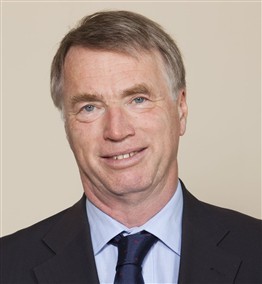Bringing the Governing Board and F4E closer to work as one team


In July 2011 Stuart Ward was appointed Chair of the Governing Board (GB), the body whose main task is to supervise the implementation of F4E activities and offer strategic guidance. During his first address to F4E staff, he took the opportunity to introduce himself, thank colleagues for their strong commitment to the ITER project and promised to deepen the channel of communication between the members of staff and the Governing Board. We took the opportunity to speak to him and ask his opinion on a number of topics.
F4E News: In June 2006 you started as Delegate of the UK Government to F4E. In March 2010 you became Vice Chair of the Governing Board and in July 2011 you were appointed Chair of the Governing Board. How has F4E evolved during this period and what do you consider as some of its key milestones?
SW: When I first got involved in the discussions about F4E, our key priority was to find the right institutional arrangement for Europe to deliver its contribution to ITER. We started by developing the concept of an organisation that would be able to procure its share of components and engage with Europe’s industry in a dynamic manner. This concept has today transformed into a fully fledged organisation, with the right level of competence and expertise built up and fully operational. More than 300 people are now employed in F4E, contracts are being placed and work is being carried out on the construction site in Cadarache. The progress on the site speaks for itself and testifies that ITER is becoming a reality.
F4E News: What are some of the key challenges that F4E still faces?
SW: The distinguishing feature of ITER is its multiple complex interfaces. The unique way that this international project is devised teaches all parties to face and resolve challenges together through rigorous follow up, adaptability, precision and strong commitment. It is within this context that F4E has to operate. A major factor is F4E’s dependence on ITER International Organization (IO), particularly in the area of designs and specifications which go through several revisions. Therefore, a clear challenge for F4E is to help ITER IO improve and finalise the designs and in parallel appoint suppliers who can comply with the tight schedules and deliver the components for an acceptable price.
This brings me to my next point which is linked to the way F4E engages with industry. We need to engage and lead the industrial community to see the benefits of investing in fusion. A forward looking industrial policy is needed more than ever if fusion is to become a driver for innovation.
F4E News: What is the main objective that you have set yourself as Chair of the GB?
SW: I am a firm believer that the success of F4E depends on its workforce and its capacity to deliver. This depends in part on the guidance and leadership it receives from the Governing Board. My objective is to bring the GB and F4E closer in order to build a solid partnership and work as one team towards our common objectives.
F4E News: During the last GB, it was agreed that a new committee would be established to improve the overall coordination in F4E and its workflow in terms of decision-making.How do you expect this new configuration to work in practice?
SW: The configuration of the existing committees had to evolve in order to permit the Governing Board to address its oversight of F4E’s strategic direction, its organisational purpose and its corporate accountability. The objective is to improve the potential of the committees to support the GB and take stock of their contribution in the most meaningful way. The Executive Committee will from now on focus its advice on procurement strategy, with the new Administrative and Finance Committee reviewing the budget, work plan and administration in preparation for the GB. The Audit Committee has had a useful start and the GB will be invited to renew its mandate at the next GB meeting. The Technical Advisory Panel will strengthen its duties of offering technical advice and expertise.
The chairs of the four committees together with the European Commission and France, the host country of the ITER project, come together in the Bureau, which will support the GB by ensuring that the work of the committees is properly integrated.
F4E News: You have been involved in the Management Advisory Committee (MAC) of ITER as an EU expert.What are the merits of this unique collaboration and what still remain its stumbling blocks?
SW: I was asked to be part of Europe’s delegation to MAC when I became Vice Chair of the GB. Unless you are prepared to get fully involved in the way this project is managed you cannot grasp its complexity. MAC takes a close interest in all aspects of ITER that are critical to its success. It has been valuable to understand the way the different contributions from the seven parties are managed and to appreciate how dependent we are on the quality of leadership of ITER IO. Europe, because of the size of its financial contribution and the location of ITER, is a major partner for ITER and thus plays a key role in MAC.